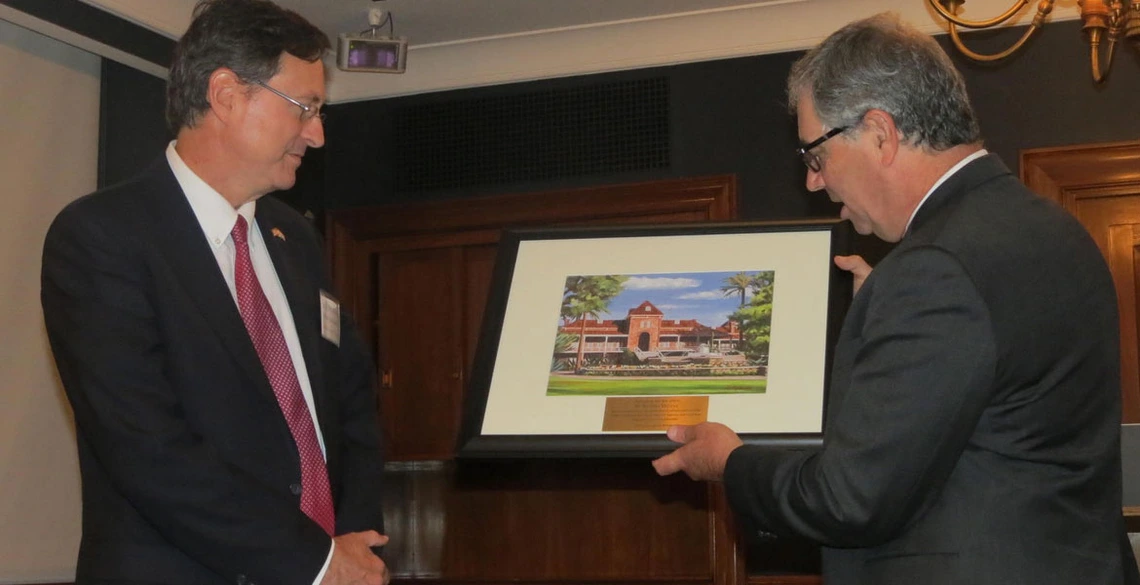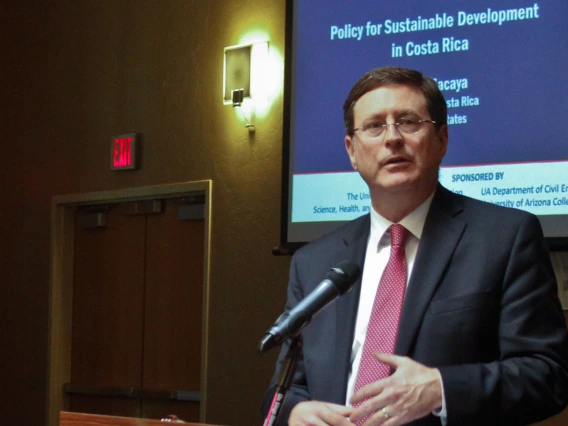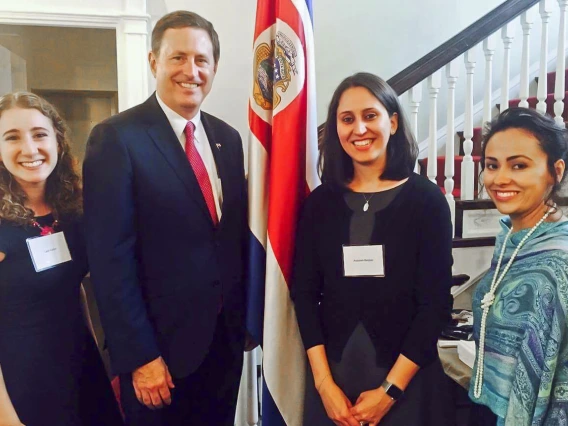Costa Rican Science Diplomat Honored at UA Reception
National academy leaders, ambassadors, politicians and U.S. state department representatives recognize science diplomacy work of Roman Macaya and University of Arizona.

UA acting Provost Jeff Goldberg, right, awards a plaque to former Costa Rican Ambassador Roman Macaya to acknowledge his promotion of scientific relations between Costa Rica and the United States.
Roman Macaya, former ambassador of Costa Rica to the United States, has played a key role in promoting cultural and scientific relations between the United States and Costa Rica.
The UA Science, Health and Engineering Policy and Diplomacy team, led by Hassan Vafai and Kevin Lansey in the Department of Civil and Architectural Engineering and Mechanics, or CAEM, hosted a reception honoring Macaya on July 11, 2018, in the Dirksen Senate Office Building in Washington, D.C.
Macaya, who is a biochemist and entrepreneur, was his country’s U.S. ambassador from August 2014 to July 2018. On Aug. 1, 2018, he assumed the presidency of the Costa Rican Social Security Fund, which runs most of the country’s public health services and pensions.
Lansey, professor and former CAEM department head, welcomed attendees and introduced UA acting Provost Jeff Goldberg, who talked about UA’s expanding global strategy. Goldberg described the UA’s strategic plan as “setting a new standard of global impact and mobility by embracing global educational partners, scaling global research impact, and expanding access to global experiences for students.”
The UA’s plan, Goldberg said, is to work with international partners to understand and solve local challenges around the globe. He cited Macaya as an inspiration for the UA plan to set up “living labs” in Tucson and throughout Latin America to address challenges in health, energy, human mobility and public security.
Representing Science Diplomacy
Science diplomacy shows how science can build bridges between societies when official relationships may be strained. Mahlet Mesfin, deputy director of the Center for Science Diplomacy, an arm of the American Association for the Advancement of Science, noted the advantage of Macaya’s status as a scientist-politician.
“There is no better person who exemplifies science diplomacy than Ambassador Macaya,” Mesfin said. “What a unique and special opportunity it was for Costa Rica to have a scientist representing its interests in the United States.”
Mesfin described how Macaya has inspired scientists and diplomats to become leaders and mobilized the Latin American diplomatic community in Washington, D.C., to work with these emerging leaders. “He has rolled up his sleeves and brainstormed with us about the future of science diplomacy,” she said.
Macaya, said Mesfin, is an exemplar of an important concept: representation. “For scientists to understand the role they can play in diplomacy and for diplomats to understand how science can be used to inform and shape what they do, it takes strong representatives and role models,” she said.
Building on Partnerships
“Everyone here is involved in academic or scientific collaboration and diplomacy,” said Macaya in his closing remarks as he thanked the hosts. That “everyone” included UA President Robert C. Robbins, Sen. Jeff Flake, and Arizona Reps. Andy Biggs, Kyrsten Sinema and Debbie Lesko.
Macaya noted the progress already made by the UA-Costa Rica partnership in areas like public health and reducing carbon emissions, and said he hoped that future collaborations would extend to areas such as decarbonization of the economy, smart transportation, water treatment and management, space applications such as CubeSats, and a UA micro-campus in Costa Rica.



